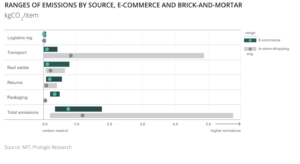With e-commerce setting records last year and parcel deliveries forecast to grow by 80 percent over the next decade, a study by the MIT Real Estate Innovation Lab reveals the environmental benefits of online shopping. Using average emissions results from the MIT study, the share shift to e-commerce resulted in approximately 2,4 percent fewer emissions per parcel.
Carbon emissions from online shopping are on average 36 percent lower than those produced by in-store shopping. E-commerce was a more sustainable option in more than 75 percent of the base case trials by MIT. For each scenario, the study used 40.000 trials of a Monte Carlo simulation that modeled a variety of consumer behaviors that, in aggregate, are important indicators of environmental impact: the number of items purchased, distance to/from store and logistics facility, returns, and type of transport. In addition to the base case, 11 other scenarios were studied which changed an aspect of consumer behavior or retailer operations.
Consolidating deliveries on a “circular route” reduces transportation-related emissions by almost 90 percent. Transportation is the largest source of in-store shopping-related emissions and produces 2,5 times the carbon emissions of e-commerce packaging, its largest carbon footprint contributor. In the case of direct-to-home delivery, a full standard van can replace more than 100 individual car trips. In turn, order consolidation and network optimization reduce costs for e-commerce operators.
Direct-to-home delivery from urban fulfillment centers can be a powerful lever to further decrease emissions. Built-out logistics networks that deliver goods from urban fulfillment centers close to consumers (rather than from facilities outside the urban core) can save some 50% of transport-related greenhouse gas emissions and reduce the overall footprint per package by an average of 10%. Placing goods as close as possible to the end consumer minimizes final delivery distances and congestion. This improves delivery times and reduces costs by maximizing delivery fleet load capacities.
Advancements in smart buildings, electrification of vehicles, packaging, advanced data analytics, and artificial intelligence (AI) can foster even more sustainable operations.
Check out the full report here.


[…] recent study by MIT concluded that eCommerce is a more sustainable option compared to brick-and-mortar shopping due to […]